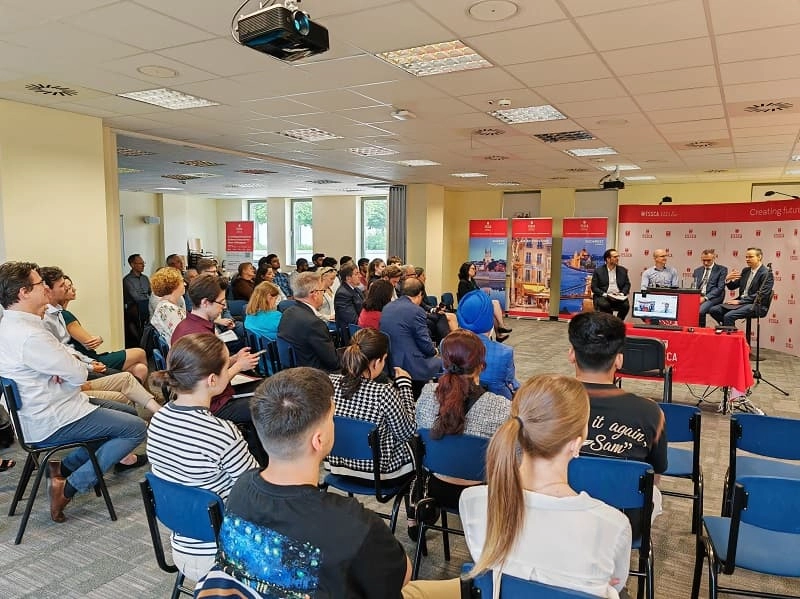What role does sport play in developing leadership skills?
Movement teaches eternal development, determination, faith, humility, perseverance and teamwork. These skills can make a big contribution to becoming a leader. The French ESSCA School of Management International's Hungarian Campus, in collaboration with the French Institute of Budapest, organised a roundtable discussion on 15 May 2024, in connection with the "greenest" Olympic Games, on the role of sport in the development of leadership skills.

The most important event of the year, the 33rd Summer Olympic Games, will be hosted in Paris. It will be the first venue to be held in 95% existing buildings in the spirit of sustainability. 1,000 km of new cycle paths and around 3,000 rental bikes will be available to the 15,000 athletes, 45 million volunteers and 15 million visitors. For the occasion, 200 000 new trees will be planted and 700 special drinking fountains will be installed in the French capital. In addition to sustainability and environmental concerns, the importance of the role of sport is a key common link with the Games. This is why the ESSCA business school organised a round table discussion around this theme. In addition to the school's management from abroad and at home, top executives from Accace Hungary and Morgan Stanley Hungary, among others, shared their experiences at the conference.
Similar mentality connects
According to a 2020 survey, 102 out of 102 executives surveyed played sports. Sporting and competing leaders from a young age say that exercise teaches them perpetual improvement, determination, faith, humility, perseverance and teamwork, skills that have also helped them to become leaders later in their careers.
Colleagues who have become teammates tend to be like-minded. And regular exercise is an excellent cure for professional stagnation and stress. "For me, sport helps reduce stress and gives me energy for new challenges. And we use sports activities within the company to build teams and speed up work,"
Green Olympics - Sustainable University
Founded 115 years ago, the ESSCA School of Management focuses on combining its values of cultural diversity, vibrant student life, professionalism, commitment to sustainability and sporting events in its daily life. It promotes the sport mindset, i.e. the development of a leadership attitude through movement and the joy of playing together, through its many programmes.
"We are exploring how sport can be a catalyst for the training of committed and responsible leaders who are aware of their own social impact. We are integrating the issue of social responsibility into management, which is also driven by sport, in a way that inspires change in society." - said Dr Jean Charroin, Director General of the ESSCA School of Management.
Let sport shape management attitudes!
For the first time in the history of the Olympic Games, there will be a marathon mass run. The event will also be open to determined amateurs.
"In my opinion, there are many parallels between sport and corporate culture. But the focus on professional sport does not take into account the specificities of sport as a leisure activity for the masses." - warned Dr David Ranc, Professor at the ESSCA.
Sport prepares you for a career
In a study, 86% of men in senior management positions surveyed played sport as young men. This has accelerated their career trajectory, which they repay by valuing the candidate's sporting background as a positive in the selection process.
Sport provides vision, dreams, courage, daring and strategic thinking
"Game theory suggests that martial arts significantly improve social interactions. Becoming a martial artist is about learning to face failure. The life of the martial instructor is about controlling space and striving for (mostly) positive outcomes." - explains Dr Balázs Vaszkun, Managing Director of Galloman Translation and Interpreting Agency and former ESSCA student.
"2024 is not only an Olympic year. Budapest will also host the FIDE Chess Olympiad, which will provide a unique opportunity to reflect on the ways in which sport, and chess in particular, can shape business success. Chess develops strategic thinking, pattern recognition, adaptability and decision-making under pressure. Many of Morgan Stanley's amateur and competitive chess players recognise the power of chess to build resilience, creativity and innovation. It helps us excel in today's complex business environment." - stressed Dr Norbert Fogarasi, Managing Director of Morgan Stanley Hungary and FIDE Candidate Master chess player.
The professional well-being of managers and staff contributes to the success of an organisation, and sport plays a key role in this. Exercise develops stamina and purposeful focus in its practitioners from the beginning to the end of their careers.
Lying on the floor rested - another must for a senior manager - read our previous article!
